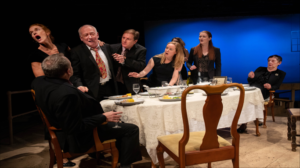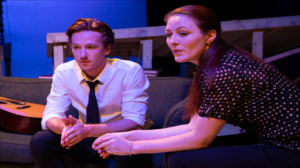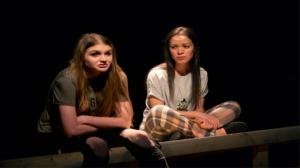By Tracy Letts; directed by Louise Fischer; New Theatre, Newtown; 6 June – 7 July 2018

Once again, the New has excelled expectations. Any production of this multi-award-winning play is an immense undertaking. It’s long, complicated, complex. It tells of a family imploding on itself as raw emotions and hidden secrets are exposed. Director Louise Fischer calls it “one of the masterpieces of the 21st century” – and she treats it with the meticulous care and attention to detail it deserves.
Set on a farm in a hot Oklahoman summer, the story revolves around the funeral of Beverley Weston, played persuasively by James Bean, whom we meet briefly but memorably, at the beginning of the play, as he sets the scene. “My wife takes pills. And I drink. That’s the bargain we’ve struck” he explains to Johnna (played with quiet, observant intensity by Emilia Stubbs Grigoriou), a young Cheyenne woman he has employed to keep house. His description hardly prepares her for the scenes she will witness as his family comes together a little while later for his funeral.
. . . she treats it with the meticulous care and attention to detail it deserves.
Every character in this play is intrinsic to the story – each created with the fine, precision of a perceptive playwright – and brought to life here by a sensitive director and a skilled cast.
The role of the matriarch, Violet Weston, is pivotal to the plot. Abused as a child, now suffering from cancer and addicted to a cocktail of drugs, Violet is a vicious woman who manipulates the family with an adroit hand. It is a demanding role, but one Alice Livingstone has obviously studied and savoured. Her timing is perfect, making the most of the cynical humour that relieves the tension of the play. There isn’t a moment when she is on the stage where the anguish and bitterness of the woman aren’t apparent. They are there in her walk, the way she holds her head, her piercing eyes, the brutal delivery of venomous lines, the agony of the loneliness she eventually faces. This is a stellar performance from one of the talented stalwarts of the New theatre.
She is supported by twelve equally committed performers who, under Fischer’s discerning direction, have delved into Letts’ characters with scrupulous depth. Each brings out the varying insecurities of the family member they portray. Their flaws, fears and fraying self- esteem are revealed as tempers rise, accusations fly and secrets emerge.

Mattie Faye, Violet’s shrewish, sharp-tongued sister is played with relish by Emily Weare. Peter Flett plays her easy-going, peace-seeking husband, Charles. Jake Fryer-Hornsby their harried, nervous, secretive son.
Violet’s daughters are very much the product of a family that harbours resentments and jealousy. Helen Stuart gives a powerful performance as Barbara, the eldest daughter, a woman trying to appear in control as everything about her life crumbles around her. Adrian Adam plays her errant husband Bill, Kirra Farquharson their precocious, pot smoking fourteen-year-old daughter.
Sonya Kerr is fittingly reticent and taciturn as Ivy Weston, the youngest of the sisters, who bears the brunt of Violet’s critical tongue. Amy Scott-Smith, is the more liberated but unstable middle sister, Karen, who is engaged to the sleazy, four-times divorced Steve Heidebrecht, played by Lyndon Jones. Brett Heath is the local Sheriff, Deon Gilbeau.
Designer Sallyanne Facer has cunningly used the full width of the stage and a series of rostra and stairs to suggest the three-storey farmhouse. This, with Michael Schell’s lighting, gives Fischer the levels required by the script to keep the family under constant observation’ by the audience. Thus, Johnna can be seen sitting in the attic reading TS Eliot, while the sisters rail in the sitting room, the others play cards at the dining table and Violet slumps in her room.

The New can be justly proud of this deftly directed, carefully paced and intuitively performed production.